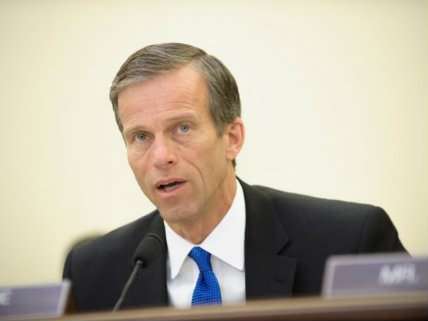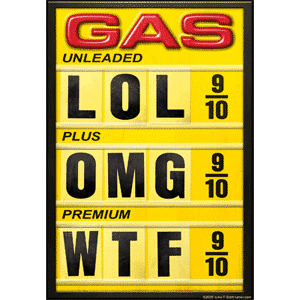Republicans for Raising the Gas Tax?

With gas prices around the country at lows not seen for years, America's political class smells an opportunity: It must be time to raise the gas tax.
Even some Republicans seem to be open to the possibility. Over the weekend, Sen. John Thune (R-SD) was asked about the possibility of raising the federal tax on gasoline. In response, he gave one of those classic Washington non-answers. "I don't favor increasing any tax," he said, "but I think we have to look at all the options." This another way of saying, "yes, but I don't want to just say 'yes'."
There are two reasons why this issue is coming up now. The first is that there's a perennial shortfall in the Highway Trust Fund, which funds federal roads projects. The trust is paid for by a fuel tax of 18.4 cents per gallon, which has been level since 1993. Estimates from last summer put the shortfall around $170 billion. It's currently being funded via an $11 billion stopgap measure that expires in May. The politicos who manage the fund are looking for ways to fill that pot.
That's the policy reason. But the policy justification isn't exactly new, and proposals to hikes the gas tax typically haven't gone anywhere.
As much as anything, this is about low gas prices, which, at least in theory, make it easier to raise federal gas taxes. It's a kind of tax hike opportunism: Consumers are saving money at the pump, so some of the savings ought to go to the federal government. Even Republicans, typically the anti-taxers in government, aren't immune from the lure of easy tax hikes.
To be fair, the gas tax proposal put forth by Sen. Bob Corker (R-TN) last summer is revenue neutral, at least in theory. It would hike the federal gas tax by 12 cents a gallon over two years, and index it to inflation going forward, erasing the shortfall in the process. The gas tax hike would be offset by adjustment to the tax extenders package.

It's not the worst idea imaginable, given the offsets (presuming they actually balance out); it's a user fee, basically, that funds highway projects by charging people who drive.
But it would add to the pain at the pump for the entire nation, which, it's worth remembering, already pays about 31 cents per gallon in state fuel taxes and fees, on average, in addition to the federal tax.
A big part of the root problem here is the federalization of highway infrastructure funding. Is Congress really the best organ for making decisions about road projects all around the nation? Some of those decisions, at minimum, are probably better left to the states.
The federalization of highway funding has led to all sorts of problems and perverse incentives, as the Reason Foundation's Bob Poole noted in congressional testimony last year. Federal involvement raises the cost of projects, and encourages new projects rather than maintenance of existing infrastructure. And funding projects with user fees is politically tricky, making shortfalls more likely, even for projects with merit.
But for some our friends in Congress, it's easier to take advantage of low gas prices by pushing for tax hikes than address these sorts of core problems.


Show Comments (139)